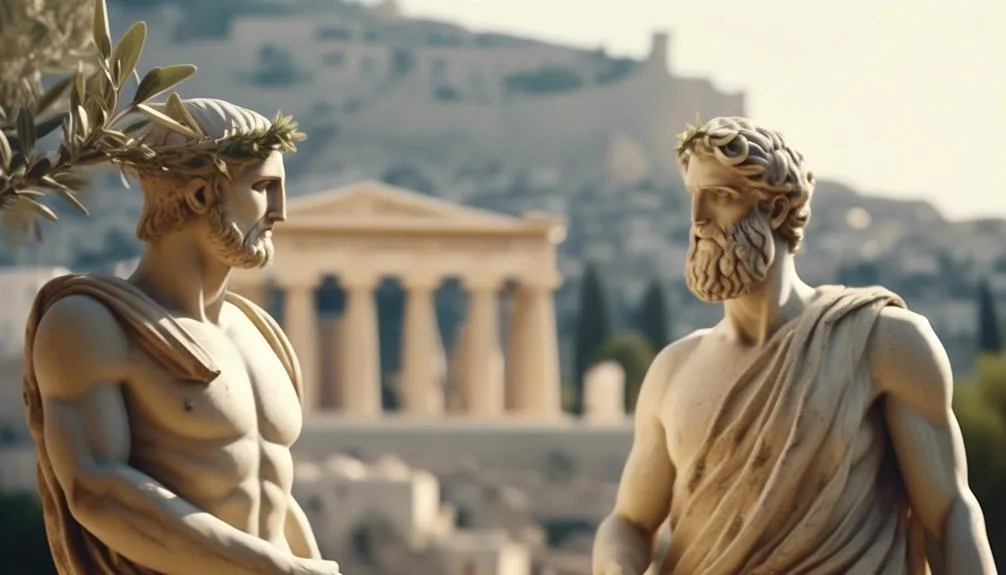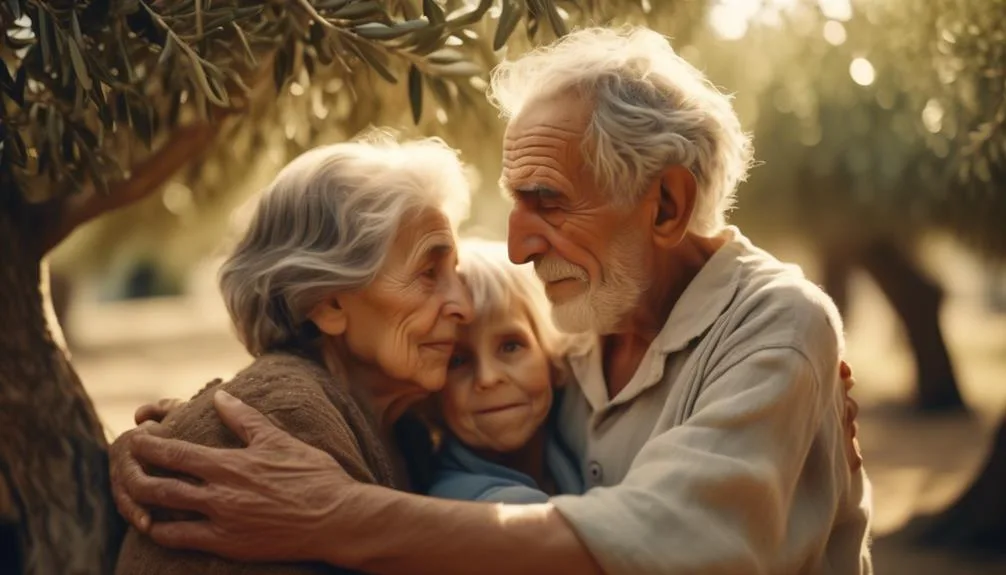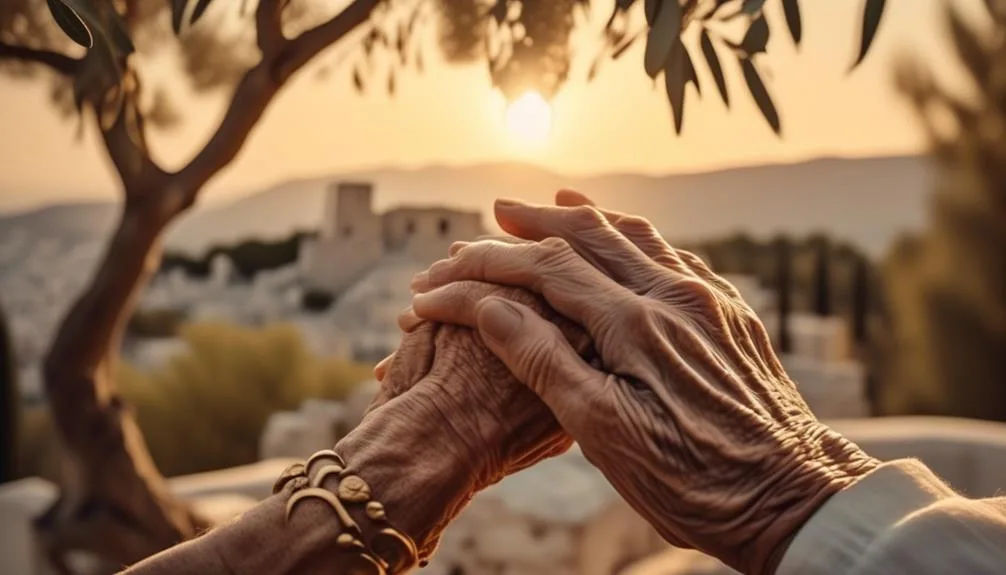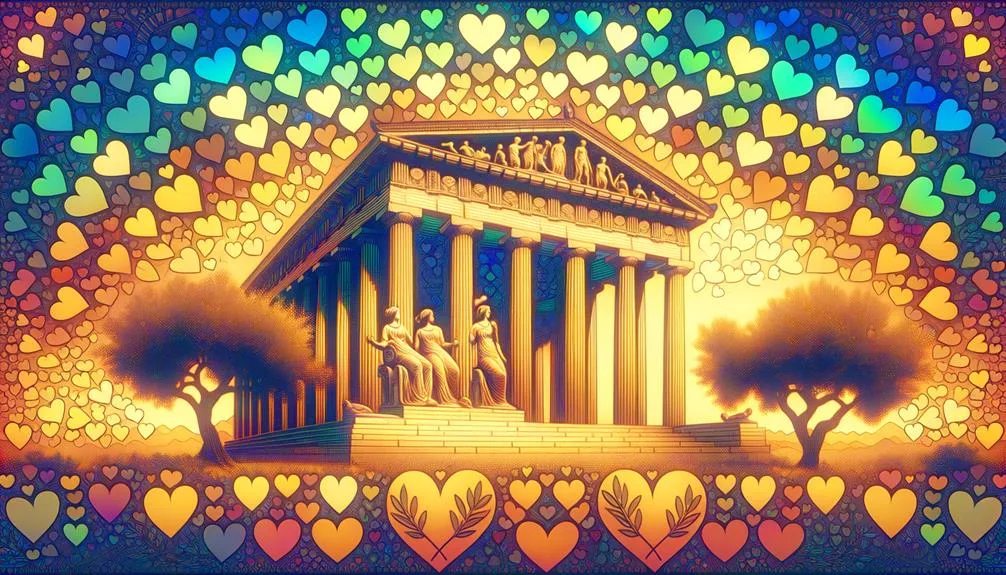As you navigate the intricate tapestry of human emotions, consider the Ancient Greeks as your seasoned guides through the labyrinth of love. They didn't just stumble upon the concept; they dissected it with the precision of a philosopher's mind, recognizing that love wears many masks.
You're about to embark on a journey that will introduce you to Eros, with its consuming flames, and Philia, which weaves a tapestry of deep-seated trust and camaraderie. Yet, these are merely the entry points to a much broader spectrum that encapsulates the human experience. Beyond them lie expressions of love that have shaped our understanding of relationships, community, and self-worth.
Can you recognize these facets within your own life, or will you discover new dimensions of affection that challenge your preconceived notions? Join us as we trace the contours of these ancient insights, uncovering how they continue to resonate through the ages and influence our modern perceptions of love.
Key Takeaways
- Ancient Greek love encompassed a wide spectrum of types, including erotic love (Eros), affectionate love (Philia), familiar love (Storge), playful love (Ludus), obsessive love (Mania), enduring love (Pragma), self-love (Philautia), and selfless love (Agape).
- Eros, the love associated with sexual passion and desire, was considered intense and potentially dangerous by the ancient Greeks. It could also be used for spiritual awakening through practices like Tantra.
- Philia, valued as love between equals, did not require physical attraction and was often experienced among friends who had overcome hardships together. Loyalty, camaraderie, and sacrifice were characteristic of this type of love.
- Storge, primarily related to kinship and familiarity, was found between family members and childhood friends. While it could be a strong bond, it could also become an obstacle on the spiritual path.
Eros: Passion's Power
Eros, the ancient Greek embodiment of passionate love, wields a power that can both ignite the flames of desire and serve as a conduit for deeper spiritual connections. You're delving into a realm where the transformative nature of eros is palpable, reflecting its potential to catalyze profound personal evolution.
Ancient Greek society treated eros with a mix of reverence and caution, recognizing the intense and unpredictable effects it could have on individuals and relationships. This form of love wasn't merely about fleeting pleasures; it encompassed a spiritual dimension that could guide one toward enlightenment or, conversely, to a path of turmoil.
Exploring the dangers and intensity of eros in this context underscores its dual capacity to uplift or destabilize, demanding a nuanced understanding of its role in human experience.
Philia: Friendship's Bond

In the rich tapestry of Ancient Greek love, philia emerges as the deeply cherished bond of friendship, marked by mutual respect and shared experiences that forge an unbreakable camaraderie.
Exploring the depths of philia reveals:
- Enduring connections that withstand the tests of time and circumstance.
- The power of loyalty as a cornerstone of these profound relationships.
- Shared values and interests that act as the glue of philia.
- Sacrifices willingly made, reflecting the strength of the bond.
- The celebration of each other's successes as if they were one's own.
Analyzing philia, you'll find it's less about fleeting emotions and more about a committed, reciprocal partnership. It's a connection that nourishes both individuals, fostering growth and offering a reliable anchor in life's unpredictable seas.
Storge: Kinship's Embrace

While philia cements the bonds of friendship through shared experiences and mutual respect, storge wraps itself around the more innate connections we find within the family and those we grow up alongside, forming the bedrock of our earliest emotional experiences. The role of storge in familial relationships is fundamental, nurturing a sense of security and belonging that fosters our ability to form healthy attachments later in life. It's the quiet, often unspoken love that says, "You're family."
The impact of storge on spiritual growth cannot be underestimated. It sets the stage for developing empathy and compassion, qualities essential for deeper spiritual connections. By internalizing storge's unconditional support, you're empowered to explore spirituality with a grounded sense of self.
| Aspect | Role in Familial Relationships | Impact on Spiritual Growth |
|---|---|---|
| Storge | Forms emotional bedrock | Fosters empathy |
| Security | Nurtures stability | Encourages exploration |
| Unconditional Love | Supports growth | Enhances compassion |
| Empathy Development | Builds healthy attachments | Deepens spiritual practice |
| Compassion | Teaches care for kin | Expands spiritual capacity |
Ludus: Flirtation's Dance
Ludus captures the essence of youthful infatuation, where playful flirtation and heart-fluttering interactions pave the way for lighthearted romance. You're exploring the innocence of young love, a phase where emotions are as light as the breeze, yet they whisper the potential of deeper connections.
The art of playful seduction isn't about commitment; it's about enjoying the moment and the exhilaration of new connections.
- Flirtatious teasing that challenges and charms
- Lighthearted dates that prioritize fun over intensity
- Non-verbal cues, like a coy glance or a playful touch
- Casual conversations peppered with laughter and wit
- The thrill of the chase and the excitement it brings
Dive into Ludus and you'll find a refreshing realm where love is a game played with smiles and winks, not weighted down by the gravity of forever.
Mania: Love's Frenzy

Mania grips the heart with an iron fist, leading you into a whirlwind of obsession and intense desire that can overshadow all reason and balance in a relationship. This fervent state often tumbles into the dark side of mania: destructive obsession. It's not just about love anymore; it's an all-consuming force that can have a profound impact on relationships, warping them into something unrecognizable.
| Aspect | Mania's Effect | Consideration |
|---|---|---|
| Emotional Health | Compromised by obsession | Needs monitoring |
| Relationship | Strained by over-dependence | Requires balance |
| Self-Perception | Eroded by jealousy | Must cultivate self-worth |
| Partner's Well-being | Negatively impacted by possessiveness | Needs space and respect |
| Longevity | Threatened by codependency | Calls for healthy autonomy |
Analyzing mania within the context of Greek philosophy elucidates how this passion, when left unchecked, can be detrimental.
Pragma: Love's Longevity

Over time, Pragma evolves as a testament to love's endurance, requiring a harmonious blend of mutual respect, shared goals, and ongoing effort to thrive in long-term relationships. You'll find that:
- Mutual respect is the cornerstone of Pragma, without which love can't withstand the test of time.
- Shared goals unite partners, creating a sense of purpose that navigates the relationship through life's complexities.
- Ongoing effort is crucial; love must be actively maintained, not passively expected to endure.
- The importance of compromise in enduring love can't be overstated; it's the glue that binds the relationship.
- Exploring the challenges of maintaining pragma in modern relationships reveals societal pressures and individualistic tendencies that can erode longstanding bonds.
Understanding Pragma is understanding that love's longevity isn't a given; it's a deliberate, thoughtful process.
Frequently Asked Questions
How Did the Concept of Philautia Influence Social and Political Life in Ancient Greece?
You must understand that philautia shaped ancient Greek ethics, fostering self-respect that underpinned political cohesion. It wasn't just personal; it was a societal glue, vital for democracy and civic responsibility.
In What Ways Did Ancient Greek Literature and Mythology Depict Agape Love, and How Did It Differ From Its Practical Application in Society?
You've seen agape in Greek myths as unconditional love, but societal norms often limited its practice. Platonic interpretations in literature painted a purer form than you'd typically find in everyday ancient Greek life.
How Did the Ancient Greeks Reconcile the Pursuit of Eros With Philosophical Ideals of Moderation and Self-Control?
You balance eros with Stoic passion, aiming for a philosophical romance that honors both desire and self-restraint. Greeks believed in enjoying love while maintaining the virtues of moderation and control.
Were There Any Specific Rituals or Cultural Practices in Ancient Greece That Were Designed to Cultivate or Honor Ludus Love?
You'll find that in ancient Greece, gymnasium courtship and Dionysian festivals often celebrated ludus love through playful competitions and spirited celebrations, fostering social bonds through these culturally ingrained practices.
How Is the Modern Interpretation of Storge Love Different From Its Ancient Greek Origins, and What Historical Factors Contributed to These Changes?
You'll find modern storge love has evolved through cultural shifts, broadening from strict kinship to include deep friendships. Love taxonomy expanded, adapting historical nuances that reflect today's diverse relationship dynamics.
Conclusion
As you've journeyed through love's myriad forms, consider this: a staggering 75% of people report experiencing Eros, yet it's Pragma that sees couples through decades.
This spectrum of Ancient Greek love isn't just historical—it's the tapestry of human connection. Embrace each thread, from the warmth of Philia to the sacrifice of Agape.
Your heart's capacity is vast; nurture all its facets for a love as enduring as the ancients' wisdom.

